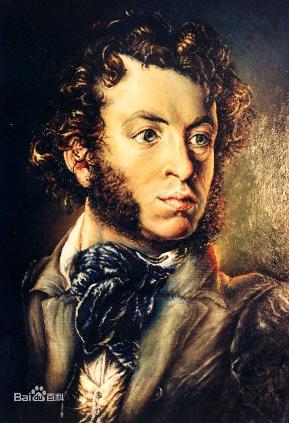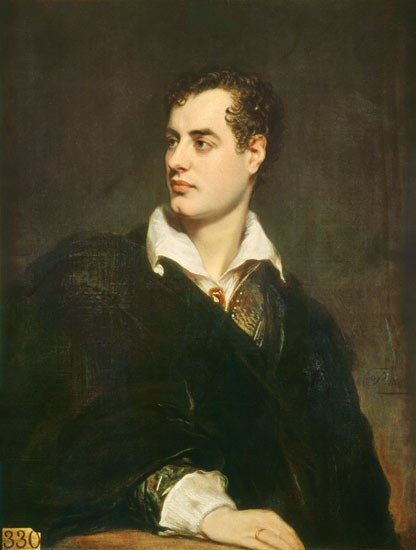Poetry Analyse #1
 | Alexander Sergeyevich PushkinAlexander Sergeyevich Pushkin was born on June 6, 1799 in Moscow. His first major work was the poem Ruslan and Ludmila. His political verses associated him with the Decembrist revolt, causing him to be banished. He worked on Boris Godunov and the novel in verse Eugene Onegin before Nicholas allowed him to return to Moscow in 1826. Pushkin died at age 37 after being forced into a duel. Reference: Bio. True Story A+E Television Networks, LLC. 1996 http://www.biography.com/people/alexander-sergeyevich-pushkin-9448737 |
If by life you were deceived
Alexander Pushkin
If by life you were deceived,
Don't be dismal, don't be wild!
In the day of grief, be mild,
Merry days will come, believe!
Heart is living in tomorrow,
Present is dejected here,
In a moment, passes sorrow
That which passes will be dear.
Analysis: This is a poem written by a famous poet Alexander Pushkin. It talked about people should be calm even if they were deceived by life; they should look forward and always believe that the better day will come. The mood is hopeful and positive
At the beginning of the poem, it quotes" If by life you were deceived" (Line 1, Pushkin), it used personification, "deceived by life" basically means something terrible and unlucky happen. Life is not always perfect, we should realized this all the time.
It quotes " Heart is living tomorrow" (Line5, Pushkin), it used personification, shows that people should focus on their future, and always have hope that tomorrow will be better.
The theme of the poem is life is not always great, there would be something terrible happen, but we should believe that a brighter is eventually coming, and all the sorrow would become nice memory.
Poetry Analysis #2
 | Lord George Gordon ByronLord George Gordon Byron (1788-1824)was as famous in his lifetime for his personality cult as for his poetry. He created the concept of the 'Byronic hero' - a defiant, melancholy young man, brooding on some mysterious, unforgivable event in his past. Byron's influence on European poetry, music, novel, opera, and painting has been immense. he was educated until he was ten. After he inherited the title and property of his great-uncle in 1798, he went on to Dulwich, Harrow, and Cambridge, where he piled up debts and aroused alarm with bisexual love affairs. Staying at Newstead in 1802, he probably first met his half-sister, Augusta Leigh with whom he was later suspected of having an incestuous relationship. Reference: The Literature Network 2000 http://www.online-literature.com/byron/ |
Epitaph to a Dog
George Byron
Near this Spot
are deposited the Remains of one
who possessed Beauty without Vanity,
Strength without Insolence,
Courage without Ferocity,
and all the virtues of Man without his Vices.
This praise, which would be unmeaning Flattery
if inscribed over human Ashes,
is but a just tribute to the Memory of
BOATSWAIN, a DOG,
who was born in Newfoundland May 1803
and died at Newstead Nov. 18, 1808.
When some proud Son of Man returns to Earth,
Unknown to Glory, but upheld by Birth,
The sculptor’s art exhausts the pomp of woe,
And storied urns record who rests below.
When all is done, upon the Tomb is seen,
Not what he was, but what he should have been.
But the poor Dog, in life the firmest friend,
The first to welcome, foremost to defend,
Whose honest heart is still his Master’s own,
Who labours, fights, lives, breathes for him alone,
Unhonoured falls, unnoticed all his worth,
Denied in heaven the Soul he held on earth –
While man, vain insect! hopes to be forgiven,
And claims himself a sole exclusive heaven.
Oh man! thou feeble tenant of an hour,
Debased by slavery, or corrupt by power –
Who knows thee well must quit thee with disgust,
Degraded mass of animated dust!
Thy love is lust, thy friendship all a cheat,
Thy tongue hypocrisy, thy heart deceit!
By nature vile, ennobled but by name,
Each kindred brute might bid thee blush for shame.
Ye, who behold perchance this simple urn,
Pass on – it honours none you wish to mourn.
To mark a friend’s remains these stones arise;
I never knew but one -- and here he lies.
Analysis: This is a poem written by George Byron. The poem is the epitaph to a dog. It told that the dog was dead for save his master, He is hero but a poor hero. The mood of this poem is sad and heavy.
In the poem, it quotes " Who labour, fight, lives, for him alone" (Byron, 21) it used personification to describe how brave the dog is when he fighting on him own, and also demonstrate a horrify picture.
The theme of the poem is that dogs is human's best friend and also a selfless animal. They are loyal to their master and try their best to protect them all the time.